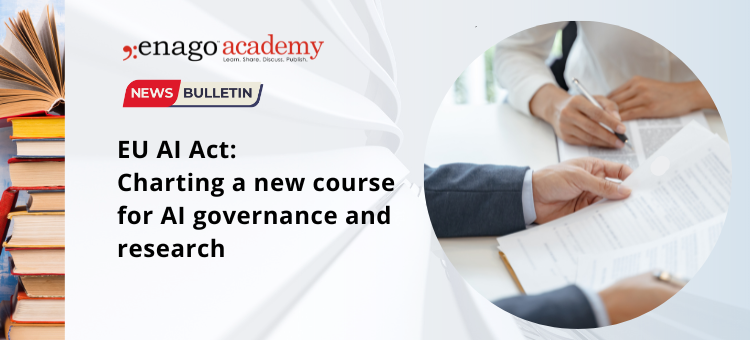EU AI Act: Charting a new course for AI governance and research

In a landmark move, the European Union (EU) is set to introduce the world’s first comprehensive legislation aimed at regulating artificial intelligence (AI). With the introduction of the EU AI Act, the world is witnessing a pivotal moment in the evolution of AI governance. This landmark legislation aims to address the complex ethical, societal, and technological challenges posed by AI while fostering innovation and safeguarding fundamental rights. From stringent requirements for high-risk applications to transparency mandates for general-purpose models, the EU is charting a new course in AI governance.
Impact on Research: Balancing innovation and accountability
At the heart of the EU AI Act lies a delicate balance between fostering innovation and ensuring accountability. Central to the EU’s approach is the regulation of AI models based on their perceived risk levels. The law imposes stricter rules on high-risk applications, such as AI used in hiring and law enforcement, requiring developers to demonstrate safety, transparency, and compliance with privacy regulations. Lower-risk AI tools will also be subject to certain disclosure requirements, ensuring users are aware when interacting with AI-generated content.
While some researchers welcome the EU AI Act for its potential to encourage open science and responsible AI development, others express concerns about its potential to stifle innovation. Critics point out perceived gaps in the legislation, including exemptions for military and national-security purposes.
The impact of the EU AI Act on researchers is a subject of considerable debate. While the legislation includes provisions to exempt AI models developed purely for research purposes, there are concerns about potential effects on innovation. Researchers may need to adopt practices that prioritize transparency, accountability, and bias mitigation to comply with the new regulations.
Navigating the Regulatory Landscape: Challenges and opportunities
As the EU AI Act takes shape, researchers and industry stakeholders alike face a myriad of challenges and opportunities. From navigating complex compliance requirements to adapting internal processes, the road ahead is fraught with uncertainty. However, amidst the challenges lie opportunities for collaboration, innovation, and the advancement of AI technologies responsibly and ethically.
Powerful AI Models Under Scrutiny: Implications for GPT and beyond
One of the most pressing questions surrounding the EU AI Act is its impact on powerful AI models like GPT. As policymakers grapple with the regulation of high-impact capabilities, the implications for models that push the boundaries of AI innovation are profound. From stringent safety testing to transparency mandates, the future of AI regulation will undoubtedly shape the trajectory of models like GPT and their role in society.
Promoting Open-Source AI
In a departure from traditional regulatory approaches, the EU AI Act champions the principles of open-source AI. By incentivizing transparency, collaboration, and the sharing of AI information, the legislation heralds a new era of innovation within the EU. From start-ups to established players, the push towards open-source AI promises to democratize access to AI technologies and drive forward the frontiers of innovation.
Conclusion: Charting the future of AI regulation
Enforcement of the EU AI Act will be overseen by the European Commission, with the establishment of an AI Office tasked with evaluating models and monitoring related risks. However, questions remain about the practical implementation of these enforcement measures and the resources needed to scrutinize submissions effectively.
In conclusion, the EU AI Act represents a significant step towards regulating AI technologies while balancing innovation and societal concerns. Its impact on research and powerful AI models like GPT will depend on how effectively it is implemented and enforced, highlighting the need for ongoing dialogue and collaboration between policymakers, researchers, and industry stakeholders. While challenges lie ahead, the EU’s bold regulatory initiative sets a precedent for the global governance of AI and offers a vision for a future where innovation thrives in harmony with accountability and transparency.








